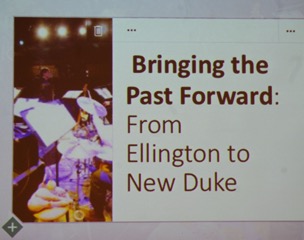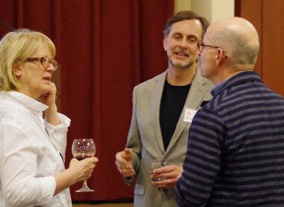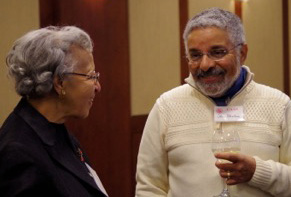Connecticut Academy of Arts and Sciences
Minutes of the CAAS 1450th Meeting
March 8, 2016
Whitney Center, Hamden, CT
Minutes of CAAS Meeting 1450: Brian Q. Torff, Professor of Music at Fairfield University and Musical Director of New Duke
 Gregory Tignor, President of CAAS, convened the meeting at 5:24. He introduced Professor Torff by first giving a summary of his musical performance history. He then spoke of Brian as a composer listing pieces done for TV, the Boston Pops, and New Duke. He then spoke of Brian as an author. Tignor then reported on Torff’s professorial activities. He then turned the meeting over to Brian Torff.
Gregory Tignor, President of CAAS, convened the meeting at 5:24. He introduced Professor Torff by first giving a summary of his musical performance history. He then spoke of Brian as a composer listing pieces done for TV, the Boston Pops, and New Duke. He then spoke of Brian as an author. Tignor then reported on Torff’s professorial activities. He then turned the meeting over to Brian Torff.Brian began by beginning to move the past forward. He asked everyone is stand and walk with him. He counted rhythm and had the audience clap while he played an African drum. He mentioned this is a West African tradition that he uses with his classes. The West African Ring Shout-the rock in the pond.
He is taking Duke Ellington’s music and bringing it forward. What does the past mean to an art form like music? Ellington was an instrumental force, an inclusive artist. All people were Ellington’s people. Ellington composed, arranged, rehearsed, revised, performed, revised, recorded and started again. The speaker showed Ellington at the piano after one of his performances. Torff showed a musical clip illustrating Ellington’s mastery of piano playing.
 For Torff, Ellington was a great composer, a tireless innovator. He had a great presence as a bandleader. Torff played a musical clip of Ellington’s work as a bandleader. He then showed a still image of Ellington’s piano at the St. John the Divine cathedral.
For Torff, Ellington was a great composer, a tireless innovator. He had a great presence as a bandleader. Torff played a musical clip of Ellington’s work as a bandleader. He then showed a still image of Ellington’s piano at the St. John the Divine cathedral.Brian then turned to his own musical background saying he was a product of Chicago-1960’s and early 70’s-blues, rock, jazz, folk, FM radio. His strong influences were The Beatles, James Brown, Blood, Sweat, and Tears. It was a time of mythic imagination, hybrids, and experimentation.
He played an Mp3 of Blood, Sweat and Tears-House in the Country, Dec. 16, 1967. Brian confessed to being influenced by the energy and drive of rock and jazz horn arrangements during the 70s.
He spoke extensively about his time with Erroll Garner with great fondness for his piano playing although his style was very unique and their time together was far too short because of Garner’s death.
 Brian’s band was assembled in 2011 supported by a NEH grant with a goal to modernize Ellington’s music. He played tribute to the following members vocalist Darryl Tookes, Jamie Finegan, trumpet, Rick Sadlon, alto sax, John Fumasoli, trombone, Dave Childs, piano, Greg Burrows, drums and Brian Torff, bass, harmonica and musical director, New Duke band.
Brian’s band was assembled in 2011 supported by a NEH grant with a goal to modernize Ellington’s music. He played tribute to the following members vocalist Darryl Tookes, Jamie Finegan, trumpet, Rick Sadlon, alto sax, John Fumasoli, trombone, Dave Childs, piano, Greg Burrows, drums and Brian Torff, bass, harmonica and musical director, New Duke band.Brian showed a photo of the New Duke from a Morse Recital Hall at Sprague Hall on Dec. 4, 2015.
He played several Mp3’s demonstrating his musical “mashup” concept by showing the influence of Chuck Berry, Big Joe Turner and others. His musical goal is characterized by his striving for authenticity.
He showed one final video of his own composition “Working on a Bassline”—an African Praise song concept in a funk style performed by New Duke band.
Professor Torff concluded his talk by stating his belief that bringing the past forward means having the ability to move both forward and backward at the same time.
Question:
Where do you see American jazz going today?
Answer:
Jazz is too good to go away. It is now fragmented. But, jazz can take care of itself. Some young people are fascinated by jazz greats. People are rediscovering music. May not make a great living but young people will still work at it.
Question:
Is it true that Erroll Garner couldn’t read music?
Answer:
True he could not read music. But, he was enormously talented and creative. He once told me that he tried to make each gig a great big party.
Minutes by Monica Aspianto